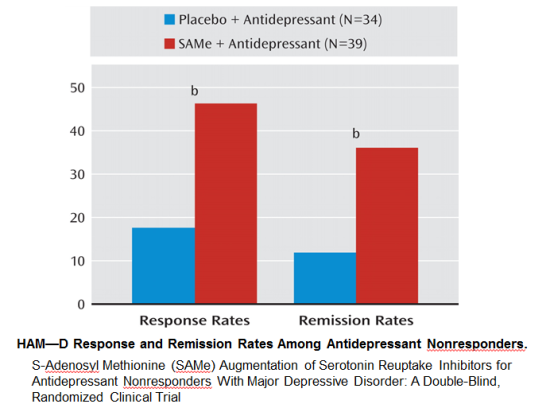
Ever hear of someone using Sam-e for depression? S-adenosyl methionine (SAM-e, SAMe) is a naturally occurring molecule that is available as an over-the-counter dietary supplement [1]. It is found in every living cell, functioning as a donor of methyl groups in over 100 various reactions.
As early as 1973 and over the next two decades, over 40 clinical trials were discovering and confirming the powerful anti-depressive properties of SAMe [2]. A meta-analysis of these studies concluded that SAMe is effective for treating depression, when compared to a placebo or TCA’s, an older generation of conventionally used antidepressants [3].
Years later, another group conducted a meta-analysis that included searching 25 databases and identifying 47 studies relating to SAMe and depression. Three weeks of SAMe treatment compared to placebo was associated with a 6-point increase on the 17-point Hamilton Rating Scale for Depression [5]. Moreover, when compared to conventional TCA’s, they were found to be equally effective at treating depression [4].
The Depression Clinical and Research Program (DCRP) out of the Massachusetts General Hospital investigated whether combining SAMe with modern antidepressants (SSRI’s, SNRI’s), would be more effective at treating depression than the antidepressants alone. A preliminary trial, led by Jonathan E. Alpert, MD, PhD, and published in 2004,treated 30 patients with 400-800 mg of SAMe, twice daily, for six weeks. These patients were already taking either SSRI’s or SNRI’s, but were not responding well to treatment. The resulting data reported response and remission rates of 50% and 43% respectively [6].
In 2010 the same group published their results from a single-center, 6-week, randomized, double-blind trial of SAMe augmentation to SRI’s, this time led by Dr. George Papakostas. 73 SRI-Resistant participants with major depressive disorder were enrolled and evaluated using the 17-point Hamilton Rating Scale for Depression. They reported that of participants adding 800mg of SAMe daily for six weeks to their SRI treatment, 36.1% of them responded well, and 25.8% of them remitted. Comparably the participant’s placebo groups were assessed to have a response and remission rate of 17.6% and 11.7%, respectively [1]. Shortly after, these numbers were reported to be incorrect and that the response/remittance rates were actually 46.1%/35.8%, respectively for the SAMe group [7].



The study headed by Dr. Papakostas sparked a lot of interest in the psychiatric community. Simultaneously, Dr. Jerome Sarris of the University of Melbourne, Department of Psychiatry, ran a sub-study comparing SAMe as an independent treatment, to a standard SSRI, Escitalopram. The results are about to be published to the Journal of Effective Disorders in August of this year (2014). Over 12 weeks, 144 patients with Major Depressive Disorder (MDD) were randomized to SAMe (1600-3200mg/daily), escitalopram (10-20mg/daily), or a matching placebo treatment. Surprisingly, SAMe produced superior results to escitalopram with a 45% versus a 31% response rate, and a 34% versus a 23% remission rate, respectively. While this data has some very significant implications, it should also be noted that a serious limitation exists in the fact that participants were part of the larger ongoing study at the Massachusetts General Hospital – as acknowledged by the authors [8].
No significant adverse effects have been observed for the dose ranges referenced in this article [9]. Not much data exists, however, for long-term effects, but recently the DRCP published results from one of their studies that long-term cardiovascular effects should seemingly not be a concern (limitations acknowledged). [10]
Given all the data that exists today, and as concluded various times by the DRCP, SAMe would certainly seem to be an effective supplement for treating mild depression. For major depression, quite a bit of evidence exists supporting SAMe for an adjunct or independent treatment method, but this area still needs additional exploration.
References:
1. S-adenosyl methionine (SAMe) augmentation of serotonin reuptake inhibitors for antidepressant nonresponders with major depressive disorder: a double-blind, randomized clinical trial. [Pubmed Link]
2. S-Adenosyl-L-methionine (SAMe): from the bench to the bedside--molecular basis of a pleiotrophic molecule. [Pubmed Link]
3. S-adenosyl-l-methionine (SAMe) as antidepressant: meta-analysis of clinical studies. [Pubmed Link]
4. S-Adenosyl-L-Methionine for Treatment of Depression, Osteoarthritis, and Liver Disease: Summary [FDA Link]
5. A Rating Scale for Depression [Pubmed Link]
6. S-adenosyl-L-methionine (SAMe) as an adjunct for resistant major depressive disorder: an open trial following partial or nonresponse to selective serotonin reuptake inhibitors or venlafaxine. [Pubmed Link]
7. The effect of phosphatidylserine on golf performance [Pubmed Link]
8. S-adenosyl methionine (SAMe) versus escitalopram and placebo in major depression RCT: Efficacy and effects of histamine and carnitine as moderators of response. [Pubmed Link]
9. Role of S-adenosyl-L-methionine in the treatment of depression: a review of the evidence. [Pubmed Link]
10. Bioavailability of S-adenosyl methionine and impact on response in a randomized, double-blind, placebo-controlled trial in major depressive disorder. [Pubmed Link]